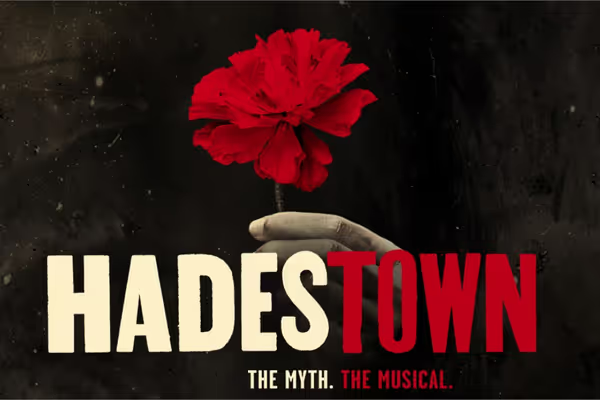Broadway Mythbusters: Your Guide To The Greek Mythology of HADESTOWN

This season, Broadway is traveling way on down to Hadestown, in a new musical based on two of Greek mythology's most famous tales.
Following two intertwining love stories - that of young dreamers Orpheus and Eurydice, and that of King Hades and his wife Persephone - Hadestown brings audiences on a hell-raising journey to the Underworld and back, while breathing new life into some very old material.
So, before you strap in and take your own trip (way) down under, brush up on the original myths that make up the tale of this exciting new musical.
Warning: Ancient Spoilers Ahead.
Orpheus and Eurydice
After the god Apollo gifted his son Orpheus a lyre, the boy learned to play so well that it is said that no man or beast in nature, nor nature itself, could resist his beautiful music.
When Orpheus fell in love with Eurydice, the two were wed and lived happily together for a time. When Hymen arrived to bless the marriage, however, he prophesized that the couple's happiness is not meant to last.
The narrative of the tale diverges a short time later when Eurydice goes wandering in the forest. Some of the legends tell that she was chased by a shepherd, Aristaeus, who is entranced by her beauty, and died of a snake bite. Other versions recount that Eurydice was dancing with the Nymphs when struck with the fatal bite.
When Orpheus learned of Eurydice's demise, he sang his sorrow with his lyre, moving everything in nature, and both gods and humans, with the sounds of his grief.
Stricken by his loss, at the suggestion of the gods and nymphs, Orpheus concluded that he must descend to Hades to see his wife. Though any other mortal wouldn't have survived the trip to the Underworld, Orpheus went forth protected by the gods, passing through the souls of the unknown in the Stygian realm, and charming Cerberus, the three-headed dog.
Once Orpheus reached his destination, he presented himself to Hades, the god of the Underworld, and his wife Persephone. After Orpheus played his lyre for the couple, melting Hades heart, the god of the Underworld agreed to relinquish Eurydice's soul.
However, the bargain came with a condition: Eurydice would follow him while leaving the Underworld. but Orpheus could not look back at her before entering the light, or he would lose her forever. If Orpheus could sustain his patience and faith, he would once more have his love by his side.
Assured in his ability to complete the task, Orpehus thanked Hades and Persephone and left to return to the human world.
On his journey back, however, Orpheus could not hear or feel Eurydice behind him and began to fear that the gods had tricked him. Only a few feet from his destination, Orpheus' faith was shaken and he looked back to see Eurydice following behind in the form of a shade, unable to become a full woman until she reached the light. As Orpheus' gaze met the sight of Eurydice, she was whisked back among the dead, forever trapped in Hades.
Orpheus attempted to return to the Underworld, but a mortal could only enter the realm of Hades once while alive. In his grief, Orpheus played a song of mourning for his lost love and called for death so that they may be reunited. Some versions of the myth tell that Orpheus is torn apart by beasts or Maenads, others tell of Zeus striking Orpheus with a lightning bolt to prevent him from revealing the secrets of the Underworld.
In the end, Orpheus died, but a piece of him remained, as the Muses saved his head to keep among the living, so that his enchanting music could live on.
Persephone and Hades
Persephone was the daughter of Zeus and Demeter, the goddess of harvest and fertility. After blossoming into womanhood, she attracted the attention of many gods, but Demeter, obsessed by love for her daughter, kept all male suitors away from her.
Among her many persistent suitors, one was more driven than all the rest- Hades, god of the Underworld. An older man, hardened by resentment of his station, lived among the dead in the dark and shadows but was immediately softened upon one glimpse of Persephone's youth and beauty.
When Hades met with Demeter to ask for her hand, she became enraged and declared that it would never happen. Dejected and broken-hearted, Hades hatched a scheme to make Persephone his wife regardless of Demeter's refusal.
One afternoon, while picking flowers in the valley, she came upon a most enchanting narcissus bloom. Stooping down to pick the flower, the earth began to erode beneath her feet, cracking to reveal Hades on a chariot pulled by black stallions. Before she could scream for help, Hades grabbed Persephone, dragging her to the Underworld while the gap in the earth closed behind them.
The whole thing had happened so quickly that none of the other girls in the valley had witnessed her kidnapping. None but the gods Zeus, brother of Hades, and Helios, god of the sun, knew what had become of Persephone.
Wishing to avoid a fight with his brother, Zeus kept silent about the incident. Helios also kept quiet, not wishing to involve himself in matters that did not concern him. Heartbroken Demeter wandered the earth in search of her missing daughter until Hecate, goddess of wilderness and childbirth, instructed her to seek the help of Helios.
Demeter visited Helios, crying and distraught over Persephone's disappearance, prompting Helios to reveal that she had been kidnapped by Hades. Upon hearing the news, Demeter vowed to take revenge, but Helios suggested that it might not be so bad for Persephone to rule alongside Hades as queen of the dead. Demeter, however, persisted. She did not believe that Hades could ever be the right husband for her daughter as ruler of the damned.
Spurred by rage that Zeus had chosen not to reveal this to her, she punished the gods for her grief, taking an indefinite leave from her duties as goddess of harvest and fertility. The consequences were devastating- harvests failed, plants lost their fruitfulness, animals died for lack of food and famine spread to the whole earth.
In their untold misery, the people cried out for help from the gods to ease their suffering, their cries reaching the divine ears of Zeus. Fearing that all humanity would disappear without his intervention, Zeus sought a solution to please both Demeter and Hades.
He promised Demeter that Persephone would rejoin her if it could be proven that she was being held against her will. Should it be revealed that she remained there of her own volition, Persephone would remain with Hades.
Hearing of this plan, Hades tricked Persephone, who cried for her release all night and day, to eat the seeds of a pomegranate. One taste of fruit of the Underworld would cause Persephone to wish to remain there with Hades.
When the time came to gather before Zeus for a solution, Persephone insisted that she wanted to live with her husband.
Upon hearing this, an enraged Demeter accused Hades of tricking her daughter. A great fight ensued, after which Demeter threatened to never make the earth fertile again, bringing about the end of humanity.
As a solution, Zeus proposed that Persephone would spend half of the time with her husband and half with her mother on Olympus. The alternative pleased neither party, who nevertheless agreed, having no other viable option.
Thusly, Persephone became the rightful wife of Hades and Queen of the Underworld. During the six months without her daughter, Demeter would become sad and would leave the earth to decline in her absence. Upon Persephone's return to Olympus, Demeter's mood would lift, restoring fertility and fruitfulness to Earth.
These were the months of Spring and Summer. This myth was created to explain the change of the seasons, the eternal cycle of Nature's death and rebirth.







